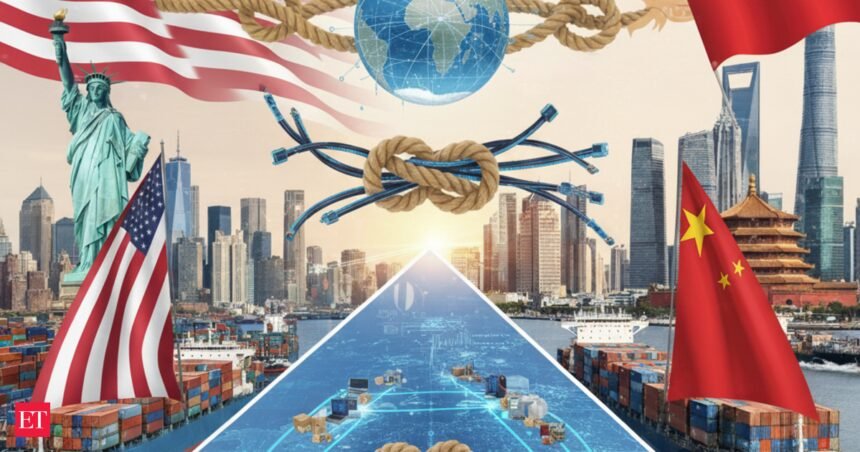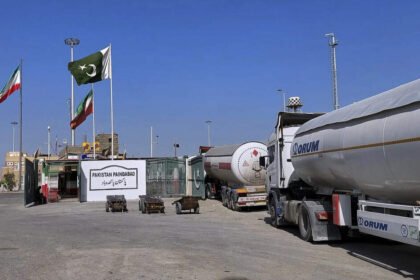The Korean phrase, loosely translated as “the United States for security and China for the economy,” refers to how the country must balance its reliance on the United States for national defense and the economic importance of China as a critical market for South Korean companies.
But the intensifying U.S.-Chinese competition makes it hard for South Korea to count on both. “It is no longer possible to maintain that type of logic,” Lee said. Increasingly, South Korea must choose, and it has not been in a position to deviate from the policies of the United States, he acknowledged.
Like many countries confronted with a more fragmented global economy, South Korea has been thrust into the middle of an acrimonious trade war, forced into a no-win position navigating export controls, sanctions and tariffs.
Now the dilemma is especially thorny for South Korea. It maintains its critical alliance with the United States, even as it is struggling to meet President Donald Trump‘s onerous demands to complete a trade deal that the two countries agreed to in principle in July.
On the other side, its giant neighbor, China, is the main target of Trump’s economic grievances. It is also South Korea’s largest trading partner, accounting for a quarter of its exports when Hong Kong is included.Ahead of an expected meeting this week between Trump and Xi Jinping, China’s top leader, on South Korean soil at the Asia-Pacific Economic Cooperation summit, Seoul has been confronted with the heavy cost of siding with the United States.This month, five U.S. subsidiaries of the South Korean shipbuilder Hanwha Ocean were hit with sanctions from China, which accused the company of “supporting and assisting” the United States in its investigation into the trade practices of the Chinese shipbuilding industry. Hanwha acquired a shipyard in Philadelphia last year for $100 million. It was expected to be at the forefront of Trump’s initiative to use foreign investment to revitalize the U.S. shipbuilding industry.
“That was a wake-up call,” said Andrew Yeo, a senior fellow and the Korea chair at the Brookings Institution’s Center for East Asia Policy Studies. “That’s a pressure point that I don’t think South Korea expected.”
When South Korea and the United States were discussing investments in American shipbuilding, the Chinese Communist Party-controlled Global Times warned in a July editorial that it was “a high-risk gamble” to believe that “geopolitics can overturn economic principles,” citing the prolonged decline of U.S. shipbuilding.
A few weeks later, Global Times published another editorial warning South Korea that if a ship carrying the country’s logo was involved in U.S. military action against a third country, it “could potentially cause trouble” and that it should be “wary of such a scenario.”
When China’s Ministry of Commerce announced the sanctions on Hanwha, the ministry said they were necessary because the company’s cooperation with the U.S. government was endangering Chinese “sovereignty, security and development interests.”
Under Yoon Suk Yeol, Lee’s predecessor, who was impeached and ousted after declaring martial law, South Korea was already redirecting its economic focus toward the United States. This shift was especially pronounced under President Joe Biden, when the United States offered investment subsidies to South Korean companies to set up American factories.
As it feels the squeeze from China, South Korea is also finding that its pledges of deeper economic ties with the United States have done little to curry favor with the Trump administration.
Under the preliminary trade deal struck in July, South Korea agreed to invest $350 billion in the United States and spend $100 billion on liquefied natural gas. In exchange, Trump agreed to lower tariffs to 15% from an initially announced 25% — a critical concession for South Korea’s automobile manufacturers.
But over the ensuing three months, Seoul has balked at some of the demands from the White House. Without a final agreement in place, the United States has not lowered the tariff. South Korea expected the bulk of the $350 billion in investments to be loans and loan guarantees, but Trump has pushed for cash investments — similar to the U.S. agreement with Japan.
However, South Korea has said cash investments of that magnitude could destabilize its currency. It has asked the Trump administration for currency swaps to minimize volatility in the foreign exchange market and prevent a collapse of the South Korean won.
Despite a last-minute scramble by South Korean officials to secure a pact before the summit on its home turf, and continued assurances from both countries that a deal is imminent, there is still no final agreement.
Chosun Ilbo, South Korea’s conservative daily newspaper and traditionally an advocate for a strong alliance with the United States, criticized Trump’s hardball tactics to squeeze concessions from the country and warned that they might push South Korean companies into the arms of China.
“Trump remains stubbornly tough on America’s allies,” wrote Yang Sang-hoon, the newspaper’s opinion columnist. “To him, the very fact that a country is an ally appears to be a major weakness.”
Trump is scheduled to meet with Lee on Wednesday in South Korea. Lee lowered expectations for a possible deal before the summit by stating in an interview with CNN that “a considerable amount of time and effort is needed for adjustment and correction” before reaching a final agreement.
South Korea’s semiconductor technology has also become a pawn in the escalating feud between China and the United States. Before Trump came to office, the United States placed restrictions on exports to China of so-called high-bandwidth memory chips, which are critical for running generative artificial intelligence systems.
While the seemingly insatiable demand for AI chips will help offset any effect from export controls in the short term, there are potential long-term dangers. Chinese chipmakers are receiving significant financial backing from Beijing to close the technological gap with overseas semiconductor firms, seeding the ground for future rivals.
June Park, a political economist from South Korea, said there was growing concern that Chinese firms would soon catch up to SK Hynix and Samsung Electronics, the two biggest manufacturers of high-bandwidth memory chips.
“The years of catching up may not be that long,” Park said.
This article originally appeared in The New York Times.







